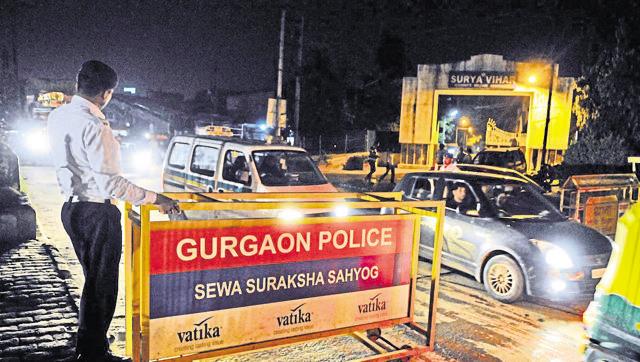
GURGAON, May 18:Police in Gurgaon are planning to induct officers from the North Eastern States so that complaints of people from those States are understood and acted upon in a better manner.
The department has written a letter to the Haryana DGP, seeking 16 mid-level police officers from the North Eastern States to be brought on deputation to Gurgaon.
DGP BS Sandhu said that a proposal would be sent to the State Government to appoint them as nodal officers to tackle problems faced by people from the seven North Eastern States currently living in Gurgaon and Faridabad.
The objective is to reduce the communication barrier that crops when people from these States go to police station with complaints. The language gap often hampers the investigation. Also a large number of crimes against North East residents go unreported because victims have little confidence in the department.
Gurgaon Police Commissioner Sandeep Khirwar plans to change this situation. “I had written a letter two weeks ago seeking induction of personnel from North East. This will give more confidence to the complainants and also improve the response mechanism. Gurgaon has a diverse population and the police must develop capacity to handle different situations,” Khirwar said.
The police department, in fact, is also planning to seek induction of officers expert in Japanese, Korean, Arabic and Pashto languages, considering that a large number of foreign Nationals are part of Gurgaon’s population. The move would ease their interaction with police, the commissioner said.
The decision by Gurgaon Police is on the lines of Delhi Police, which had initiated an even larger programme to resolve problems faced by people from North East. “We recruited 450 constables from North East, a separate unit was set up with funds of Rs 24 crore, as well as land, to make it more effective,” said Robin Hibu, a nodal officer of the special unit.
Delhi Police also conducts compulsory sensitisation programmes by victims of racial discrimination. “There has been a marked improvement in the behaviour of officers of all ranks after this move was initiated,” Hibu said.
Francis G Kharsiing, another IPS officer from Meghalaya Police posted in Delhi, said that this move could help both the Gurgaon Police as well as residents of the North East. “To understand a proble, it is important to understand the culture and language as well. This will help both sides,” said Kharsiing.
It is to be noted that Delhi’s hiring of residents from North East in 2014 happened after a hiatus of almost 17 years. In 1997, the Delhi Police stopped recruiting constables from other States, whereas earlier, considering the cosmopolitan culture of the city, people from across the country could join the department.
The move by Gurgaon Police assumes significance as a number of crimes against residents from North East are reported, but the complainants mostly allege that response from police has been less than satisfactory. On Saturday, a woman from Sikkim was gang-raped by three men.
Officials from Gurgaon Police, who have been investigating cases pertaining to residents from North East, admit that differences in language, culture and background impacts the reaction of their men. “Sometimes not only the complainant, but even the accused is from North East. In such cases, we face problems in questioning,” said an official, who preferred anonymity.
Deepak Saharan, DCP (east), who is also the nodal officer of the North East cell, said that people from North East have their apprehensions and are hesitant to confide in local police officers. “This move will definitely help,” he said.
Currently, there are around 10,000 people from the seven North Eastern States living on rent in Sikanderpur, Sukhrali, Chakkarpur, Nathupur, MG Road, DLF phase 3 and Patel Nagar. A majority of them work in call centres, malls, restaurants and other service industries.
Activists and representatives of North East residents in Delhi and NCR have welcomed the move, but said it shouldn’t be cosmetic. “Just recruiting police officials from diverse backgrounds will not be sufficient, although it is a positive move. The mindset needs to be changed. The issue of non-compliance of rules by officials at thana level should addressed,” said Maya John, convenor, Centre for Struggling Women.
Meanwhile, students from North East, who met the Gurgaon Police Commissioner in the wake of Saturday’s gang rape, said the culture of compromise should be brought to an end. “The victims are not confident to complain. They are scared to report. Many incidents go unreported as the level of confidence is low,” said Pranesh Chettri, president of Sikkim Students’ Union.
Lakpa Lepcha, secretary of Delhi-NCR Gorkha Brothers, said police should stop asking the victims to write complaint in Hindi. “Police should allow victims to write complaints either in English or regional languages. Most people are not comfortable in Hindi,” Lepcha said.
The Gurgaon-based activists working on women safety too appreciated a more diverse police force, which is sensitised and less biased.
“The police should be in tune with Gurgaon’s cosmopolitan culture. There should be more programmes, seminars to spread awareness among the police officials. Somehow, the cultural baggage needs to be shed to resolve this problem,” said Kalpana Vishawnath, founder of the NGO Safetipin.
Source: Hindustan Times


